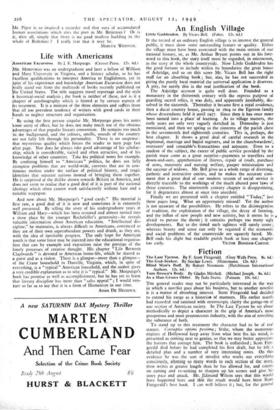An English Village
Little Gacidesden. By Vicars Bell. (Faber. 12s. 6d.)
IF the record of an ordinary English village is to interest the general public, it must show some outstanding feature or quality. Either the village must have been associated with the main stream of our national history, or' as Mr. Arthur Bryant points out in his fore- word to this book, the story itself must be regarded, in microcosm, as the story of the whole countryside. Now Little Gaddcsden has the good fortune to include within its boundaries the great house of Ashridge, and so on this score Mr. 'Vicars Bell has the right stuff for an absorbing book ; but, alas, he has not succeeded in giving the purely local material the universal application it deserves. A pity, for surely this is the real justification of the book.
The Asbridgc account is quite well done. Founded as a monastery in the thirteenth century with the express purpose of guarding sacred relics, it was duly, and apparently justifiably, dis- solved in the sixteenth. Thereafter it became first a royal residence, then a ducal country house, passing in 16o4 to the Egcrton family whose descendants held it until 1927. Since then it has once more been turned into a place of learning. _As to village matters, the early years arc only very vaguely sketched in. Domesday is just mentioned, and then we spring to the contents of the parish chest in the seventeenth and eighteenth centuries. This is, perhaps, the best chapter. It shows a great deal of careful research in the baptismal, marriage and burial registers, and in the churchwardens', overseers' and constable's transactions and accounts. Even to a student of the subject, the extent 'of public service provided by the parish must come as a great surprise—payments to travellers and down-and-outs, apprehension of thieves, repair of roads, purchase of arms, maternity and nursing welfare, pauper ministration and the succour of widows. Mr. Bell gives us a whole range of diverting, pathetic and instructive entries, and he makes the accurate com- ment that a great deal of our modern system of social service is directly traceable to the workings of the much abused poor laws of those centuries. The nineteenth century chapter is disappointing, for it degenerates almost at once into anecdote.
Finally we are presented with a chapter entitled "Today," just three pages long. What an opportunity missed! Yet the author is not unaware of the possibilities. He refers to the disintegration of tradition, the exploitation of the village, the decay of farming, and the influx of new people and new activity, but it seems he is • afraid to pursue the theme ; it contains perhaps too many ugly developments. But to the timid such ugliness will surely come ; whereas beauty and sense can only be regained if the economic and social problems of the' countryside are squarely faced. Mr. Bell ends his slight but readable parish book at least one chapter






























 Previous page
Previous page